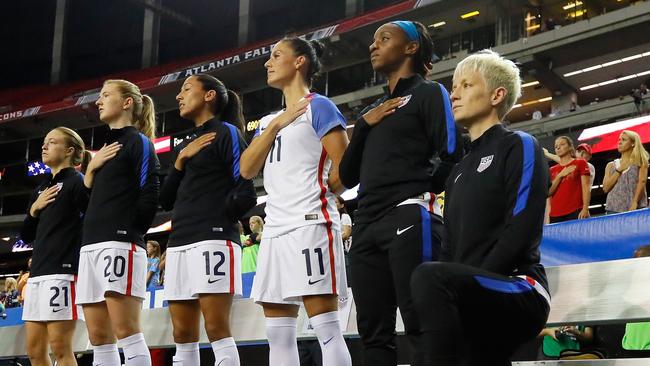Protests not permitted at Tokyo Olympics despite anti-racism movement
Athletes will not be allowed to protest at next year’s Olympic Games in Tokyo despite the recent global anti-racism movement.

Olympics
Don't miss out on the headlines from Olympics. Followed categories will be added to My News.
Despite the recent anti-racism movement, athletes will not be permitted to kneel in protest at next year’s Olympic Games in Tokyo.
In January, the International Olympic Committee banned any form of protest at the 2020 Olympics, including taking a knee or raising a fist. IOC chief Thomas Bach confirmed athletes, coaches, trainers and officials were banned from political protests on the field of play, at the Olympic Village, during the opening and closing ceremonies and on the medal podium.
“If this political neutrality is not respected, then the Olympic Games will divide, and not unite, the world,” Bach insisted.
On Tuesday, The Telegraph reported these contentious guidelines “are still in place”, despite the widespread prevalence of kneeling in the aftermath of George Floyd’s death.
This could not be more tone deaf.
— Kara Goucher (@karagoucher) June 9, 2020
Hey @Olympics!! Remember this photo that you post at least once a year of Tommie Smith and John Carlos raising a fist at the '68 Olympics? Guess what you can't use this photo to make your organization look good if you also ban and punish athletes who protest!! pic.twitter.com/6MrokwBC9q
— Gabriela DeBues-Stafford (@gstafford13) June 10, 2020
Get your sport fix on Kayo ahead of live games returning soon – classic match replays, documentaries and the latest news & announcements. New to Kayo? Get your 14-day free trial & start streaming instantly >
According to Rule 50 of the Olympic Charter, athletes who break protest rules at the Tokyo Games face three rounds of disciplinary action — by the IOC, a sport’s governing body and a national Olympic body.
“No kind of demonstration or political, religious or racial propaganda is permitted in any Olympic sites, venues or other areas,” it reads.
However, The Telegraph reported the IOC executive board would discuss anti-racism movements on Wednesday.
United States World Cup icon Megan Rapinoe vowed that athletes “will not be silenced” after the IOC warned against political protests at the Tokyo Games.
“So much being done about the protests,” Rapinoe said in January.
“So little being done about what we are protesting about. We will not be silenced.”
Megan Rapinoe responds to the IOC banning protests at the Olympics: “We will not be silenced†pic.twitter.com/69PljKC8u5
— Sports Illustrated (@SInow) January 10, 2020
San Francisco 49ers quarterback Colin Kaepernick popularised the peaceful protest in 2016, which involved kneeling during the United States national anthem.
NFL Commissioner Roger Goodell apologised last week for not respecting players who peacefully protested, while FIFA and America’s National Football League have also removed sanctions.
The United States Olympic and Paralympic Committee is creating an athlete group that will look into loosening restrictions on protests at the games.
CEO Sarah Hirshland tweeted the plans for a new group, which is being formed in response to Floyd’s death and the worldwide protests that followed.
Last week, the USOPC put out a statement signalling its solidarity with black athletes, but received blowback from several athletes, most notably hammer thrower Gwen Berry, who is serving a 12-month probation for raising her fist on the medals stand at the Pan-Am Games last summer.
Berry is yet to receive an apology from the USOPC.
The most famous Olympic protest came at the 1968 Mexico City Games, when sprinters Tommie Smith and John Carlos raised their fists on the medals stand. They were sent home from the event and were largely cast out of the United States Olympic family for decades.
— With AP
Originally published as Protests not permitted at Tokyo Olympics despite anti-racism movement



